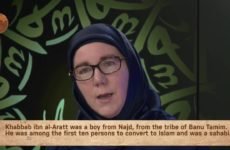Early Years of Islam: Hardship
As salaam alaikum wa rahmatullahi wa barakatuh
May the peace, blessings, and mercy of God be upon you.
In the last video we shared the stories of the first Meccans to embrace Islam, and we talked about the different paths by which they came to the Messenger. In this video, we will discuss some of the hardships they faced and the revelations sent down to fortify and prepare the believers for the long journey ahead.
As we indicated before, the Quraysh were not pleased that Muhammad was the Messenger of Allah. They saw this as a direct challenge to their authority, and they were fearful that Mecca would lose its status as a pilgrimage destination should the people follow Muhammad and destroy the idols. Losing Mecca as a place of pilgrimage would mean a significant loss in wealth and their way of life.
Because of the outward enmity of the Quraysh towards the Prophet and all those who embraced Islam, for the first three years, the conversions were kept secret. The conveying of the message was happening in small gatherings and one-on-one meetings with the Prophet Muhammad, usually in his home. New revelations were coming, and the Messenger of Allah was sharing these verses with the circle around him. Quiet places were chosen so as not to provoke the Quraysh further. This was the period of maturing in faith and the theme of the verses that were revealed were also converging on this topic. (p. 145)
This was the Prophetic Methodology of the time, and its wisdom was confirmed by two events. The Prophet, sallallahu alayhi wasallam, was of course, unhappy about the idols in the Ka’ba, and coming to the Ka’ba with Ali and Zayd, he would be disturbed by the presence of the idols and he would hit them with a piece of dampened cloth and say, “Woe unto those people! How can they attempt to play god as if in competition with Allah and make all these!” These two young men, closely observed his attitude, and they too when opportunity presented itself, would stand against these pieces of stone and wood that could not benefit anyone. One day they came to the Ka’ba, and there seemed to be no one else around. They thought of taking an Ibrahim-like stance and smashing all the idols, but they were in no position to do it just yet. But they needed to express what they were feeling, yet they did not know how to channel these feelings, so they smeared the idols that the Meccans valued with dirt and dust! (p.133)
The next morning, the polytheists of Mecca found their idols covered in dirt and were anxious to find out who it was that had done this to their gods. Such an insult to their gods had never been done before. They were provoked and they wanted, more than ever to hold onto their dilapidated ideas. Their anger provoked them to do and say inappropriate things about Allah. They openly made threats, “O Muhammad! Either you stop saying bad things about our gods, or we too will start saying whatever comes to our mouths about your Lord.”
The situation grew tense, at which point Gabriel descended with good tidings, and recited this verse from al-An’am (6:108):
And do not revile the things or beings whom they call upon besides Allah, lest (if you do so) they attempt to revile Allah out of spite, and in ignorance. Thus have We made their deeds seem fair to them; then to their (true) Lord is the return of all of them, and He will make them understand what they were doing (and call them to account for it).
This would be the final words on idol worship till the time when this problem would be solved for good. (pgs. 133-134)
Another event happened when Abu Dharr, the language master of the Ghifari tribe, came to Mecca searching out the Prophet. He had heard of the changes happening in Mecca and was dying to meet the instigator of this change. He was told that people referred to him as “sabi.” There was such pressure on the Muslims in Mecca at that time that nobody could speak about their faith openly. On the second day, Allah the Almighty brought Ali to him. Ali wanted to help this stranger who had come to Mecca from far away, but he could not speak openly about what was on his mind. After spending some time together, on the third day, they made some headway. Ali asked Abu Dharr what his purpose was. He spoke of the Messenger of Allah in order to put Abu Dharr at ease. Yes, this was who he had come to see. But they had to proceed with caution. If the Meccans saw that another person was seeking out Rasul Allah, they would try to stop that person; they could harm him. So Ali told him to trail behind him keeping his distance. “If I sense a problem, I will go to one side, pretending as if I am seeing to my needs, then you can just go your way. I will find you later, don’t worry. If I sense no danger, then you will come with me and we can go where we want to together.”
These were words that showed the kind of pressure Meccans were exerting on Muslims in those days.
Their journey started and soon Abu Dharr was at the door of the Prophet Muhammad. The door opened and he came face to face with a countenance resembling the full moon, the one whose arrival he had been waiting for years. “May the peace and greetings of Allah be with you, O Messenger of Allah,“ he called out. Abu Dharr had already submitted himself, as his greeting showed.
After speaking with Rasul Allah, Abu Dhar was so overcome that he said, “I swear by He who holds my life in His hand that I will not return home without having gone to the Ka’ba and shouting out Islam.” He proceeded to the Ka’ba and there proclaimed at the top of his lungs: “I bear witness that there is no deity but Allah and I also bear witness that Muhammad is both His servant and Messenger.”
Everybody was staring at him and started mocking him. A crowd gathered and they began to mercilessly attack him like wild animals. If not for the intervention of Abbas, the uncle of the Messenger of Allah, Abu Dharr might have been killed that day. Abbas said to the angry crowd, “What are you doing? The tribe of Ghifar is on your trade route; do you mean to cut your trade by killing him? Let him go!”
The same scene repeated the next day with the same response. Abbas once again rescued Abu Dharr from the violence of the crowd. It was clear that the atmosphere was not yet one that would allow such open proclamations. After this bitter experience, Abu Dharr returned to his village. (pgs. 138-139)
These events demonstrated the sensitivity of the time and that it was counterproductive to openly oppose the Quraysh. It created greater enmity and discord. It hardened their position against the prophet. Rather, it was best to convey the message and the new revelations in small circles and one-on-one.
This is the beginning of what I want to tell you about the first years in receiving the message—that it was done in secret, and one-on-one, and very carefully. That there was open opposition to anyone receiving the message. People coming from outside who wanted to meet the prophet were watched and attempts were made to keep people away from Prophet Muhammad, sallallahu alayhi wasallam. I want to share a bit more about this time which we will do in the next video where we will talk about the extreme conditions that some suffered because of their acceptance of the message of Islam. So until then, as salaam alaikum wa rahmatullahi wa barakatuh.
Part 2.
as salaam alaikum wa rahmatullahi wa barakatuh
May the peace, blessings, and mercy of God be upon you.
During the last video, we talked about the early revelation period. Islam was not preached openly; rather people learned about Islam through small group meetings and one-on-one meetings with Prophet Muhammad. The Quraysh were in firm opposition to the Prophet Muhammad and actively sought out any ways that they could prevent others from learning about the message.
But the difficulties did not stop there. During these first three years, the believers faced many hardships and even torture. Here too with these events, the revelations emphasized the need for steadfastness, patience, and promise of better days to come. In this video, we will talk about some of these hardhips.
One such case was Khalid ibn Said. He had a dream in which he saw himself being dragged towards the edge of a fire that looked like Hell. His father was standing behind him and was pushing him towards the fire. Just when he was about to fall into the flames, the Pride of Humankind came to his rescue, held him by the waist, and pulled him out. After consulting with Abu Bakr, Khalid came to the presence of Muhammad, sallallahu alayhi wasallam, and took the shahadah. (p.146)
While Khalid willing submitted himself, he had a very stubborn father. On hearing the news, his father took a piece of wood and hit his son until he bled. When Khalid’s response was to say, “I swear by Allah that I have submitted in faith to Him and I will never return,” his father reacted harshly, and swore, “Go wherever you will! I swear that I will not give you a penny from now on.”
Similarly, when Sa’d ibn Abi Waqqas embraced Islam after a spiritual dream, his mother began to cause him problems swearing, “Either you leave this religion of yours, or I will stop eating and drinking until I die.” Thus passed a whole day and night, and Sa’d’s mother did not eat or drink. The next morning, the Truthful Gabriel descended with the message:
But if they strive with you to make you associate with Me something of which you certainly have no knowledge, do not obey them. Even then, treat them with kindness and due consideration in respect of this world. Follow the way of him who has turned to Me with utmost sincerity and commit to seeking My approval. Then, to Me is your return, and then I will make you understand all that you were doing. (Luqman 31:15)
With this revelation, Sa’d felt relieved. He went to his mother and said: “Dear Mother! If you had a thousand lives and if you died each one of them every day, I will not leave my religion.” This was not something that a man of such tender character as Sa’d would normally say. His mother saw that Sa’d was even more determined than she, so she stopped her hunger strike and started to eat and drink.
Just as children suffered from the abuse of their parents, slaves endured even greater torture as they had no tribal protection. Among these was an Abyssinian slave named Bilal, who one day while he was grazing sheep, had a chance to observe Rasul Allah and Abu Bakr who had gone outside of Mecca to discuss new verses and to pray together. The two friends were like the sun and the moon; it was impossible not be mesmerized by the scene. Bilal thought to bring them a bowl of milk as it gave him a reason to approach them. Other incidents followed and Bilal came to know Islam before many free men. One day, Rasul Allah and Abu Bakr heard that Bilal was acting rudely towards the idols in the Ka’ba. The Meccans were infuriated that a slave could speak disrespectfully about his masters’ objects of worship. They harassed his owner as well, and Umayya ibn Khalaf did not intend to put himself at risk for a slave. Bilal was a slave among numerous of Umayya’s slaves. He said to Umayya ibn Khalaf and Abu Jahl, “Take him, he can be yours, you can do whatever you like with him!”
They took Bilal to the desert. They pushed him down on the hot burning sand, they put heavy rocks over him and inflicted him with pain and pressure. They extorted psychological pressure to recant his belief in Muhammad, peace and blessing be upon him. Abu Jahl’s enmity seemed to have no bounds. He could not fathom how a slave could accept a power other than him. Abu Jahl tortured him until Bilal lost all his strength and did not have any power left in him to speak but one word, “Ahad! Ahad! One! One!”
Abu Bakr approached the men and asked “How can you subject any man to such torture?” Then he bought and saved Bilal and showed him the way to freedom.
Another slave, Habbab ibn Arat, worked as blacksmith forging swords and shields from iron. He too accepted Islam, and he would work in front of the fire all day long, and then when he stepped outside of his hut at the end of the day, he would face the fire coming from the Quraysh, and his pain would not cease. One day his master came to him and beat him badly, tied his arms and pressed the red hot iron onto his body and tortured him until he lost consciousness. He barely came out of this beating alive. Desperate, he came to the presence of the Prophet and said the following: “Can you not ask help for us, O Messenger of Allah? Can you not raise your hands and pray for us?”
The Pride of Humanity knew what his followers were going through, but he had no resources. He knew that while passing through such difficulties, one had to stand firm. The revelations were coming down sharing that it was not only them who were suffering such troubles, but that those who came before them had suffered worse and winning Paradise was not an easy task. It seemed that Allah demanded a stance of patience and firmness from those who had been the first to take on the cause in order that they may prepare themselves better and rise to the challenge when faced with greater difficulties that they were about to experience.
At the same time, the revelations sent through Gabriel promised that one day the snow would melt and a new spring would be witnessed in human horizons, and light would be scattered everywhere. Today, some people were pouring all their resources into trying to extinguish the light of the cause of Allah, but Allah the Almighty promised in this revelation:
They seek to extinguish Allah’s light from their mouths. Whereas Allah refuses but to complete His light, however hateful this may be to the unbelievers. He it is Who has sent His Messenger with the guidance and the Religion of truth that He may make it prevail over all religions, however hateful this may be to those who associate partners with Allah. (at-Tawbah 9:32-33)
And with this verse among many others:
So be patient; surely Allah’s promise is true, and do not let those who lack certainty shake your firmness. (Ar-Rum 30:60)
Muslims today are going through difficult dark days as well. We can take solace in the precedence of these noble companions who suffered greatly for the cause of Allah the Almighty, and in the knowledge of the promise of the spring to come.
as salaam alaikum wa rahmatullahi wa barakatuh.
Note. This text was adapted and abridged from Prophet Muhammad Sultan of Hearts, vol 1 by Resit Haylamaz and Fatih Harpci, Tughra Books, New Jersey, 2014.
“Abu Dhar al-Ghifari al-Kinani also Jundub ibn Junadah ibn Sufian.
He belonged to the Banu Ghifar, the Kinanah tribe. No date of birth is known.
He died in 652 CE, at al-Rabadha, in the desert east of Medina”


















